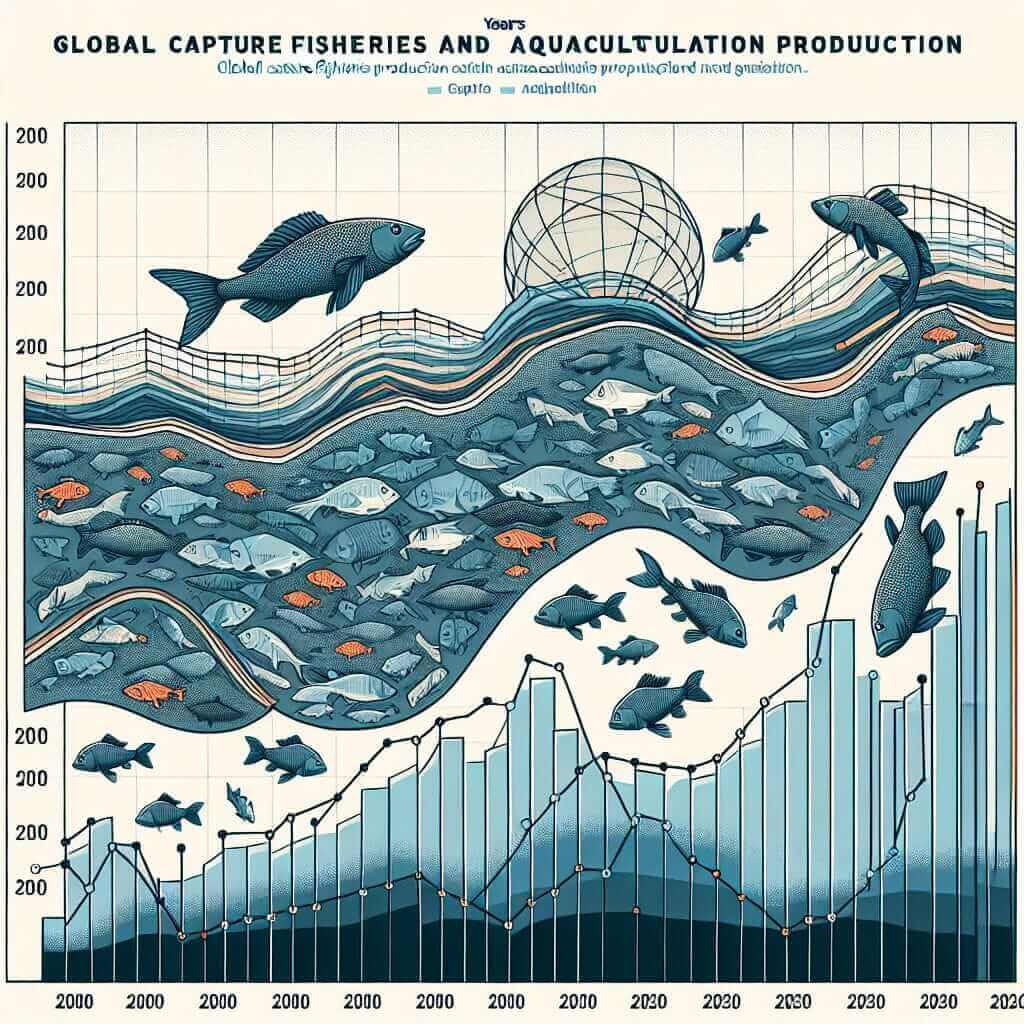The IELTS Writing Task 1 often presents data in various formats, requiring test-takers to showcase their analytical and language skills. One common theme is global trends, and “Global Fisheries Production” frequently surfaces as a topic. This article will guide you through understanding, analyzing, and writing about this topic effectively to achieve a Band 7+ score.
Understanding the Task
Before delving into specifics, it’s crucial to grasp what the IELTS examiners expect. They assess your ability to:
- Comprehend visual data: This includes identifying trends, patterns, and key features in graphs, charts, or tables.
- Summarise information clearly: Present the key information from the data in a well-structured and concise manner.
- Use accurate grammar and vocabulary: Demonstrate a strong command of English grammar and a wide range of vocabulary related to data description.
Sample IELTS Writing Task 1 Question
The line graph below shows the global capture fisheries and aquaculture production from 2000 to 2020.
Summarise the information by selecting and reporting the main features, and make comparisons where relevant.
Data Visualization

Analyzing the Data
- Overall Trend: Begin by identifying the general trend. Is global fisheries production increasing, decreasing, or fluctuating?
- Key Features:
- Capture Fisheries: How has the production from capture fisheries changed over time?
- Aquaculture: What is the trend in aquaculture production?
- Comparisons: Draw comparisons between capture fisheries production and aquaculture production. Which one has grown faster?
Model Answer (Approximately 190 words)
The line graph illustrates the global production trends in both capture fisheries and aquaculture from 2000 to 2020. Overall, total fisheries production has risen steadily over this period, driven primarily by the significant growth of aquaculture.
At the start of the millennium, capture fisheries accounted for the majority of production, reaching around 90 million tonnes, while aquaculture contributed approximately 40 million tonnes. However, capture fisheries production plateaued around 90-95 million tonnes between 2000 and 2020.
In contrast, aquaculture has experienced a dramatic upsurge since 2000. Production figures have quadrupled, reaching over 80 million tonnes by 2020. This signifies that aquaculture has become an increasingly important contributor to global fisheries production.
The graph clearly indicates a shift in global fisheries production, with aquaculture now poised to overtake capture fisheries as the dominant source in the near future.
IELTS Writing Tips for Band 7+
- Paraphrase the question: Avoid simply copying the question word for word. Use synonyms and different sentence structures to demonstrate your vocabulary range.
- Focus on Overview: Provide a clear overview summarizing the main trends in the data. This is crucial for a high score.
- Be selective: Don’t try to describe every single detail. Focus on the most significant trends and comparisons.
- Use linking words: Connect your sentences and paragraphs smoothly using appropriate linking words and phrases (e.g., however, in contrast, furthermore).
- Accurate grammar and vocabulary: Pay close attention to grammar and use a variety of vocabulary specific to describing trends, comparisons, and data.
Essential Vocabulary
- Capture fisheries: (n) /ˈkæptʃəɹ ˈfɪʃəriz/ – The practice of catching fish from the wild for commercial purposes.
- Aquaculture: (n) /ˈæk.wə.kʌl.tʃər/ – The cultivation of aquatic organisms, such as fish, shellfish, and seaweed, under controlled conditions.
- Plateau: (v) /plætˈoʊ/ – To reach a state of little or no change after a period of growth or progress.
- Upsurge: (n) /ˈʌp.sɝːdʒ/ – A sudden and large increase in something.
- Significant: (adj) /sɪɡˈnɪf.ɪ.kənt/ – Sufficiently great or important to be worthy of attention; noteworthy.
Conclusion
Mastering the IELTS Writing Task 1 requires practice and a structured approach. By understanding the task requirements, analyzing the data carefully, and using appropriate vocabulary and grammar, you can confidently tackle any data visualization task related to global fisheries production or other global trends. Remember to practice regularly, and aim for clarity, accuracy, and conciseness in your writing.